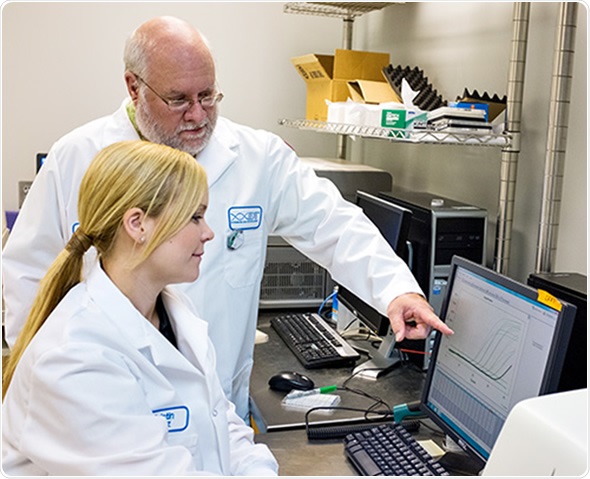In a recent DECODED research profile, Integrated DNA Technologies (IDT), details how IDT scientists Kristin Beltz and Dr Scott Rose are collaborating with Dr Brian Taylor’s research team at Battelle (Aberdeen, MD, USA) to design and validate a RT-qPCR assay that can detect the Ebola virus in the field.

The IDT PrimeTime® Ebola qPCR Assay detects Zaire ebolavirus, the species involved in the 2013–2015 West African Ebola outbreak. Initial sensitivity and specificity results were presented at the 2015 Chemical and Biological Defense Science and Technology Conference (St. Louis, MO, USA). The researchers noted that the assay has a PCR efficiency of 98.9% and that use of ZEN™ Double-Quenched Probes (IDT) lowers assay background and increases signal compared to traditional single-quenched probes in qPCR assays.
It can be difficult to distinguish Ebola from other infectious diseases, and current diagnostic tests are time-consuming and complex. They also create challenges related to sample storage and transportation, laboratory biosafety, and staff expertise in performing the assays. Having access to simple, rapid, and accurate viral testing in remote villages would be extremely useful for quelling this and future epidemics. With this goal in mind, Dr Paul Pickering (Ubiquitome Limited, Auckland, New Zealand) is spearheading the project to develop the assay for use with the Ubiquitome Freedom4 device. This portable PCR machine processes 4 reactions (sample plus negative, positive, and extraction controls) in approximately 1 hour, and is easily controlled via an iPhone or laptop. The Freedom4 device eliminates the need for sample preservation and transportation to a laboratory-based testing facility, and can simply be brought to remote locations for use during time-sensitive, public health situations.
The Freedom4 and the PrimeTime Ebola qPCR Assay are now being submitted to the US FDA for Emergency Use Authorization. Find out more about the rapid point-of-care diagnostic test for Ebola by reading the full article online.
For more information please visit www.idtdna.com. Follow us on twitter @idtdna for real-time updates and insights.
About IDT
Integrated DNA Technologies, Inc. (IDT) is the largest supplier of custom nucleic acids in the world, serving all areas of life sciences research and development. IDT’s primary business is the production of custom, synthetic nucleic acids for molecular biology applications, including qPCR, sequencing, synthetic biology, and functional genomics. The company manufactures and ships an average of 44,000 custom nucleic acids per day to more than 82,000 customers worldwide. IDT manufacturing locations include facilities in Coralville, Iowa; San Diego, California; Leuven, Belgium; and Singapore. For more information, visit www.idtdna.com.